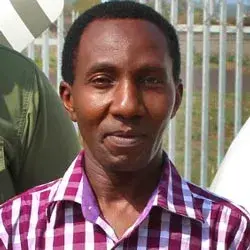Fighting for cheetahs amidst an illegal pet trade
[[{"fid":"70006","view_mode":"full","fields":{"format":"full","alignment":"","field_file_image_alt_text[und][0][value]":"Photo of lone adult cheetah standing in savanna grassland","field_file_image_title_text[und][0][value]":"Cheetahs are captured and smuggled to Gulf states to be sold as exotic pets","field_caption[und][0][value]":"","field_caption[und][0][format]":"full_html"},"link_text":null,"type":"media","field_deltas":{"1":{"format":"full","alignment":"","field_file_image_alt_text[und][0][value]":"Photo of lone adult cheetah standing in savanna grassland","field_file_image_title_text[und][0][value]":"Cheetahs are captured and smuggled to Gulf states to be sold as exotic pets","field_caption[und][0][value]":"","field_caption[und][0][format]":"full_html"}},"attributes":{"alt":"Photo of lone adult cheetah standing in savanna grassland","title":"Cheetahs are captured and smuggled to Gulf states to be sold as exotic pets","class":"media-element file-full","data-delta":"1"}}]]
In 1900, cheetahs thrived across Africa and parts of Asia. Today, that picture is vastly different. Africa’s cheetahs occupy a thin slice of their former habitat and number only 6,674. This vulnerable big cat has lost 89 percent of its historic range — and the remaining habitat falls outside of protected areas. The reasons for the crisis include human-wildlife conflict, habitat loss and fragmentation, loss of prey, and a lesser-known threat: the underground pet trade.
With its graceful beauty and astonishing speed, the magnificent cheetah has become a status symbol, especially among young, wealthy people — often in Gulf states. Smugglers traffic cheetah cubs to the Middle East most commonly from the Horn of Africa, especially Ethiopia and Somalia, taking advantage of political instability in this region. The journey is dangerous for the cubs and, sadly, up to 70 percent die en route to their buyers.
The good news is that in January 2017, the United Arab Emirates set harsh penalties for owning or trading cheetahs and other big cats — fines of up to $136,000 and jail time up to six months. Other states in the Gulf region have yet to pass similar regulations on the possession and sale and of dangerous animals like the cheetah. However, in spite of the UAE’s tough stance, the underground trade persists — investigations have recorded more than 50 social media accounts within the UAE selling cheetah cubs.
Many cheetah owners post pictures of their illegal exotic pets — big cats, critically endangered chimpanzees and orangutans, plus gibbon monkeys — on Instagram and other social networking sites. In 2016, CITES approved new recommendations designed to curb the cheetah pet trade. The measures include working with social media and e-commerce platforms to raise awareness of the problem, as well as coordinating regional law enforcement.
[[{"fid":"70018","view_mode":"full","fields":{"format":"full","alignment":"","field_file_image_alt_text[und][0][value]":"Photo of three juvenile cheetahs in African savannah grassland","field_file_image_title_text[und][0][value]":"AWF helps protect critical habitats for cheetah populations to grow across its wide range","field_caption[und][0][value]":"","field_caption[und][0][format]":"full_html"},"link_text":null,"type":"media","field_deltas":{"2":{"format":"full","alignment":"","field_file_image_alt_text[und][0][value]":"Photo of three juvenile cheetahs in African savannah grassland","field_file_image_title_text[und][0][value]":"AWF helps protect critical habitats for cheetah populations to grow across its wide range","field_caption[und][0][value]":"","field_caption[und][0][format]":"full_html"}},"attributes":{"alt":"Photo of three juvenile cheetahs in African savannah grassland","title":"AWF helps protect critical habitats for cheetah populations to grow across its wide range","class":"media-element file-full","data-delta":"2"}}]]
Securing transboundary habitats
Cheetah protection groups monitoring the trade in Somalia have estimated that up to 300 cheetahs are smuggled out of the war-torn country every year. The number is likely higher, as black-market transactions are largely hidden and undocumented. Confiscations in demand centers in the Gulf are low. Between 2010 and 2014, CITES reported that UAE authorities seized only 31 cheetahs; Saudi Arabia seized eight during the same period. The origin of the confiscated cheetahs is unknown.
The cheetah is a wide-ranging big cat, with up to 77 percent of its global population occurring outside protected areas. The range stretches across boundaries — more than half of the world’s cheetah are found in a single transboundary population spanning Namibia, Botswana, south-western Angola, northern South Africa, south-western Mozambique, and southern Zambia.
With support from African Wildlife Foundation, Kenya’s Mara Cheetah Project and Mara Lion Project monitors lion and cheetah populations in the Maasai Mara — a significant stronghold for these cats. Studies based on the behavioral data found that cheetahs avoid human presence and require both open and semi-vegetated habitat for successful hunts. Wooded areas offer concealment for cheetahs to stalk while open stretches are needed to pursue prey. In addition to establishing population densities and trends for the species, AWF works with local communities to limit habitat fragmentation and mitigate retaliatory killings of wildlife straying into settlements and farms.
AWF also helps restore and maintain critical wildlife corridors so big cats and other migratory species can access new habitats. The Amboseli-Chyulu Wildlife Corridor is an integral wildlife corridor for the cheetah that spans from Amboseli National Park to Chyulu Hills and Tsavo West National Park. Through an innovative land-lease program, AWF partners with local landowners to protect critical habitat and corridor land for cornerstone species like the cheetah while also creating incentives for local communities to participate in conservation.
